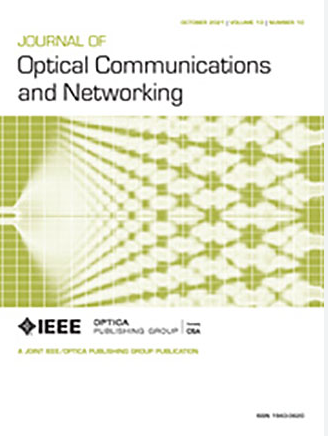Optical circuit switched three-stage twisted-folded Clos-network design model guaranteeing admissible blocking probability
IF 4
2区 计算机科学
Q1 COMPUTER SCIENCE, HARDWARE & ARCHITECTURE
引用次数: 0
Abstract
Some data center networks have already started to use optical circuit switching (OCS) with potential performance benefits, including high capacity, low latency, and energy efficiency. This paper addresses a switching network design to maximize the network radix, i.e., the number of terminals connected to the network under the condition that a specified number of identical switches with the size保证可接受阻塞概率的光路交换式三级扭曲折叠 Clos 网络设计模型
一些数据中心网络已经开始使用光路交换(OCS),其潜在的性能优势包括高容量、低延迟和高能效。本文探讨了一种交换网络设计,以最大限度地提高网络弧度,即在给定数量的相同交换机(大小为 $N \times N$)和最大允许阻塞概率的条件下,连接到网络的终端数量。之前的研究提出了一种具有 OCS 阻塞概率保证的两级扭曲折叠 Clos 网络(TF-Clos),它比具有严格意义上无阻塞条件的 TF-Clos 具有更大的网络弧度。增加级数可以提高网络弧度。与两级 TF-Clos 相比,本文提出了一种具有阻塞概率保证的 OCS 三级 TF-Clos 结构设计模型,以提高网络半径。我们将获得最大化网络半径的网络配置问题表述为一个优化问题。我们采用一种基于穷举搜索的算法,以获得满足优化问题约束条件的可行解决方案。该算法以非递增的方式确定网络半径最大的结构,以避免不必要的搜索。数值结果表明,所提出的模型比两阶段模型实现了更大的网络半径。
本文章由计算机程序翻译,如有差异,请以英文原文为准。
求助全文
约1分钟内获得全文
求助全文
来源期刊
CiteScore
9.40
自引率
16.00%
发文量
104
审稿时长
4 months
期刊介绍:
The scope of the Journal includes advances in the state-of-the-art of optical networking science, technology, and engineering. Both theoretical contributions (including new techniques, concepts, analyses, and economic studies) and practical contributions (including optical networking experiments, prototypes, and new applications) are encouraged. Subareas of interest include the architecture and design of optical networks, optical network survivability and security, software-defined optical networking, elastic optical networks, data and control plane advances, network management related innovation, and optical access networks. Enabling technologies and their applications are suitable topics only if the results are shown to directly impact optical networking beyond simple point-to-point networks.

 求助内容:
求助内容: 应助结果提醒方式:
应助结果提醒方式:


